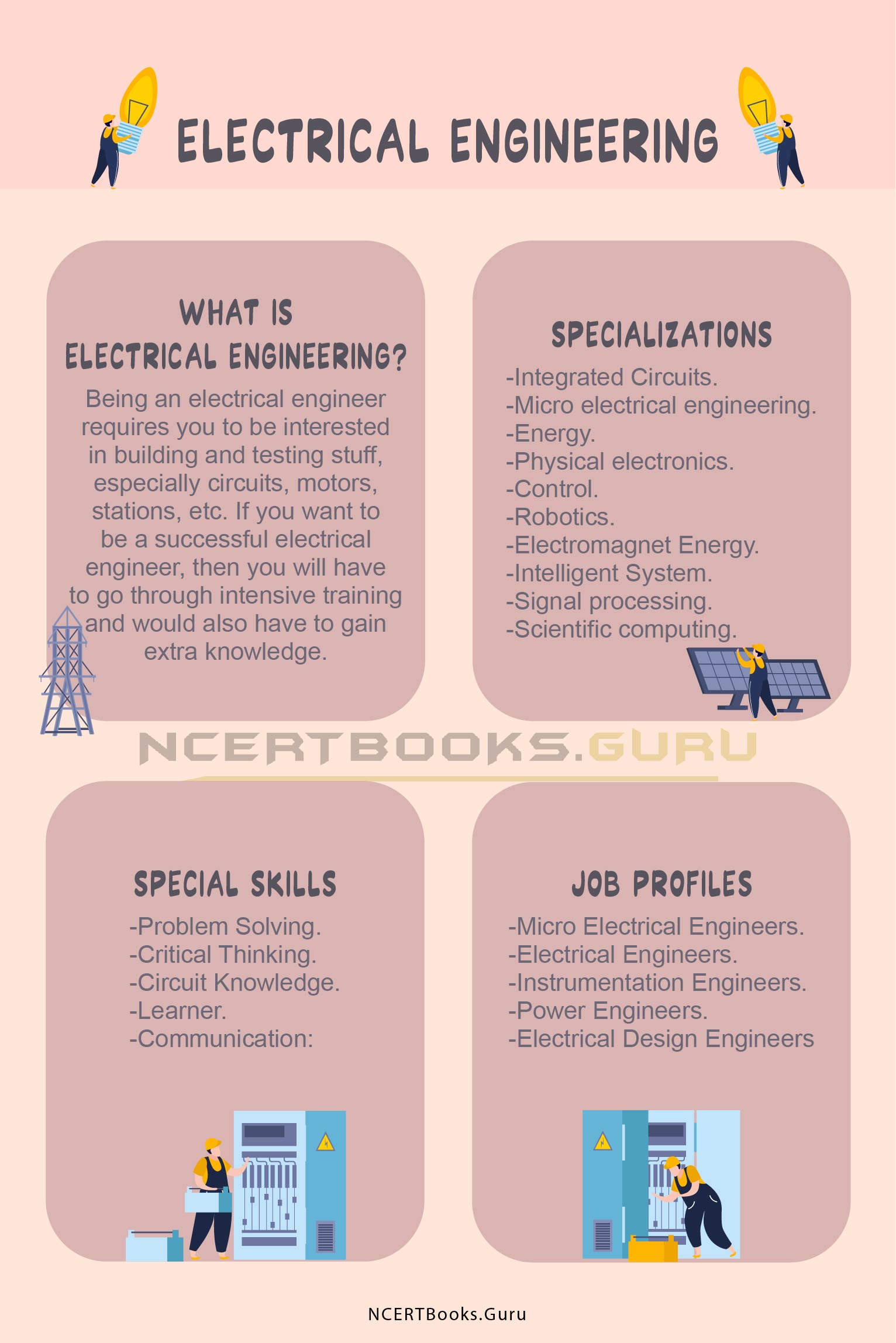How To Become An Electrical Engineer In India?: Electronic items and appliances are slowly taking over our lives, and we find these items everywhere now. We are very much dependent on such items daily.
We can use these items because electrical engineers are responsible for building and developing new technologies related to electricity.
Refer to Course Details to know more about related courses and find details like Admission Process, Eligibility Criteria, etc.
The primary or daily work of an electrical engineer includes testing equipment and finding solutions to existing problems. If you are interested in working with large machines and devices, electrical engineering is the perfect field.
This article will talk about all the things you must know to become an electrical engineer in India.
- Why Should You Do Electrical Engineering in India?
- Electrical Engineer Eligibility Criteria
- Specializations Of Electrical Engineering In India
- Special Skills That Might Help You
- Top Job Profiles for Electrical Engineer
- Salary Scale for An Electrical Engineer
- Conclusion
Why Should You Do Electrical Engineering in India?
Electrical engineering, as well as electrical engineers, have a great scope in the future. We are at the dawn of the introduction of electric vehicles in society. Soon these electric vehicles would be easily accessible and popular, creating many opportunities in this field.
Another primary reason for this sudden boom in electric vehicles is the growing demand for petrol, fuel, and their increasing prices as we know that fuels like petrol and diesel are non-renewable resources we do need to find an alternative in the upcoming future.
Being an electrical engineer requires you to be interested in building and testing stuff, especially circuits, motors, stations, etc. If you want to be a successful electrical engineer, then you will have to go through intensive training and would also have to gain extra knowledge.
The electric vehicle industry alone is expected to create about one crore jobs by the year 2030. By then, 70 million electric vehicles are expected to be on the road.
Electrical Engineer Eligibility Criteria
To become an electrical engineer in India, you must have specific educational qualifications as electrical engineering is a professional course. You cannot do this course without a specific set of skills and knowledge.
- Firstly, to become an electrical engineer, you need to opt for the science stream in class 11 or 12.
- The government should also recognize the board through which you have passed your board. You should have at least 50% marks in your class 12 to be eligible for sitting in the entrance exams.
- The next step is to pass some entrance exams and get admission into a good college. You can either do a bachelor’s degree in electrical engineering or a master’s degree in electrical engineering.
- The most crucial entrance exams are JEE mains, JEE advance, CET, VITEEE, and BITSAT. You can crack these examinations by studying on your own, or you can also take help from some coaching institutions that would help you prepare for these exams.
- A few engineering colleges also have an age limit, so you might have to check that before enrolling yourself in these colleges.
- You can then do B.TECH or B.E. in electrical engineering would be your first step to becoming an engineer. The former is a four-year course whereas the latter is a three-year course.
- Next, after completing your graduation, you can appear for the GATE examination. This exam will help you to get into a college for a Master’s Degree. Similarly, in masters, you can either do M.TECH or M.E. Both these courses are two years.
Specializations Of Electrical Engineering In India
To become an electrical engineer in India, you can choose from various specializations that are available to you. You can choose the one you have maximum interest in, which will keep your interest intact even when you have to study some boring subjects. Specialization of your choice will allow you to explore a field of your interest, also bringing out the best of your abilities.
- Integrated Circuits
- Micro electrical engineering
- Energy
- Physical electronics
- Control
- Robotics
- Electromagnet Energy
- Intelligent System
- Signal processing
- Scientific computing
Read More:
- How to become a Civil Engineer in India
- How to become a Network Engineer in India
- How to become Robotics Engineer in India
Special Skills That Might Help You
Engineering is a job that requires a proper skill set. That means some specific skills will help you to propel your career to the next level. Some of these skills are discussed below briefly.
Problem Solving:- This is a necessary skill that every engineer must have as it is a profession that requires you to think on your feet on a lot of occasions.
You will need to use the concepts you have learned and apply them practically in real life. This might sound easy, but it isn’t. Troubleshooting problems on the spot is not very easy.
Critical Thinking:- Critical thinking is an essential aspect of innovation and change. Engineers that have this ability can identify problems along with their solutions easily.
Without critical thinkers, we will not have any innovation. People who are not restricted to certain norms can be a very big asset as they think about things differently.
Such people are also able to analyze the positives and negatives of a thing very quickly.
Circuit Knowledge:- If you want to excel in electrical engineering, you must have at least the basic circuit knowledge, even if it is not your specialization or domain.
The basics of electrical circuits are not very hard due to which you can have good knowledge about them.
Learner:- As it is wisely said that learning is a never-ending process. Similarly, you have to learn a lot as an electrical engineer. This learning never stops as new technologies are being introduced.
The engineers are not instantly familiar with these new technologies, so they learn about them and then put their knowledge at them.
The communication:-The way you connect and interact with others is also essential for building your career. You cannot prosper if you cannot communicate your views and demands to your team and colleagues.
Top Job Profiles for Electrical Engineer
After completion of your bachelor’s or master’s degree in electrical engineering, you will be bombarded by a plethora of job profiles in the field of electronics. You will then have to identify the best suitable option based on your interests and liking.
Some of the most common areas of interest for electrical engineers are usually among computers, navigation, robotics, gadgets, mobiles, etc.
Below we have mentioned some of the top and common profiles available to electrical engineers.
Micro Electrical Engineers:- These electrical engineers are responsible for building and creating all the smaller components for electrical gadgets.
These engineers make all the microchips, circuits, and other components. Another major aspect of their job profile is to fabricate tiny components for other objects.
Electrical Engineers: This category of electrical engineers is responsible for most of all the processes used to create electrical components. They are generally involved with the planning, developing, production, and implementation of electrical products.
The majority of the people that finish their electrical engineering study opt for this field as the scope and area that falls under this category is pretty vast. Due to this reason, all the people can get ample opportunities for becoming successful electrical engineers.
Instrumentation Engineers:-These engineers are responsible for all the devices or instruments used for the measurement, calculation, and calibration of the instruments. Currently, there are fewer instrumentation engineers in India due to the lack of awareness and opportunities.
You would require the help of an instrumentation engineer if you are required to measure and use the temperature, pressure, and flow.
Power Engineers:-Power engineers are the people that design main power components such as motors, generators, transformers, power electronics, and so on. The main objective of such engineers is to innovate and find new things in existing components constantly. Telecommunication Engineers:-The main job profile of these engineers is to figure and work around the transmission industry. These engineers are responsible for the communication of information from one place to another. You will often find them assisting you with the setting up of your internet or mobile connections.
Electrical Design Engineers:-These electrical engineers are mainly responsible for the creation and design of new electrical systems for various applications. You can also find them developing system specifications and layouts.
Other than these specific job profiles, new job profiles are being created every day in development, manufacturing, infrastructure, scientific research, and maintenance.

Salary Scale for An Electrical Engineer
Your salary as an electrical engineer depends upon your academic qualifications as well as your knowledge. Still, the primary or average salary for electrical engineers can be broadly divided into three categories. Your salary will change over time as you gain experience and knowledge.
We have given the basic or relative salary figures for entry-level, mid-level and senior-level electrical engineers.
- The average salary for an entry-level electrical engineer is 3,50,000 rupees per annum.
- The relative salary for a mid-level electrical engineer is 7,00,000 rupees per annum.
- The average salary for a senior-level electrical engineer is 15,00,000 rupees per annum.
Conclusion
In this article, you will get to know all the necessary details that you need to know about becoming an electrical engineer in India. Information from basic requirements like eligibility criteria to a brief description of the job profiles and specializations that you can take up as an electrical engineer.
